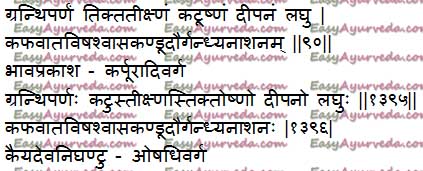Granthiparna – Polygonum aviculare: Uses, Qualities, Research
By Dr Renita D’Souza
Granthiparna is an Ayurvedic herb used in the treatment of asthma, poisoning, itching, diarrhoea, foul smell etc
Botanical Name – Polygonum aviculare
Family – Polygonaceae
Table of Contents
Qualities, uses
Medicinal Qualities of Granthiparna
Rasa (taste) – Tiktha (bitter), Katu (pungent)
Virya (potency) – Ushna (hot)
Guna (qualities) – Teekshna (sharp), Laghu (light to digest)
Karma (action) – Deepana (carminative)
Effect On Tridoshas
Balances Kapha and Vata dosha
Indications of Grandiparnam
Visha – toxic condition, poisoning
Shwasa – asthma
Kandu – itching
Dourghanda – foul smell
Uses
- Due to its astringent property it is used to stop bleeding, diarrhoea, dysentery.
- Decoction of whole plant is used in renal calculi.
- For fever, diarrhoea and in difficulty passing urine its root juice is used.
- In chronic diarrhoea juice of root or whole plant is used.
- It act as a diuretic agent.
- Leaf paste is applied in herpes.
- Its seeds are mild purgative in nature, diuretic and induces vomiting.
Sanskrit verse, distribution

Distribution
In India it is widely grown in Kashmir. It is also found in Eurasia, North America and temperate parts of the Southern Hemisphere.
Chemistry, research, controversy
Chemical compounds
Polygonum aviculare contains tanning agents, flavonoids, essential oils, carotene, vitamin C, vitamin K1, sugars, saponins, coumarins, slime, and anthraquinone glycosides etc
Research
Anticancer Activity – A research study conducted on effects of polygonum aviculare herbal extract on proliferation and apoptotic gene expression of MCF-7 have confirmed its anticancer property against breast cancer.
Antiobesity – A research study conducted on Anti-obesity effect of Polygonum aviculare L. ethanol extract in high-fat diet-induced obese mice have concluded its significant anti-obesity effect in humans.
Controversy:
Another herb by name Angelica archangelica is identified with the name Granthiparna.
Sthouneyaka
It is considered as a variety of Granthiparna. Commonly known by the name Thuneraka.
Qualities
Medicinal Qualities
Rasa (taste) – Katu (pungent), Tiktha (bitter)
Guna (qualities) – Shigdha (unctous)
Karma (actions) –
Medhakaram – Increases
Shukrakaram – Improves sperm count
Ruchya – Improves taste
Rakshoghna – Protects against evil spirits, psychological disorders
Effect on Doshas
Balances all three doshas – Vata, Pitta and Kapha Dosha.
Controversies of sthouneyaka
Commonly known by the name Thuneraka. According to Yadavji trikamjit three herbs are taken in the name of Talisapatra – Abies webbiana and one among them is Thuneraka – Taxus baccata.
Some consider Bhandira – Clerodendrum infortunatum as sthouneyaka
In Sushrutha Samhitha, sthouneyaka is mentioned in Eladighana
Sanskrit

Indications of Polygonum aviculare
Jwara – fever
Krimi – intestinal worm infestation
Kushta – skin diseases
Blood disorders
Excess thirst
Daha – Burning senation
Dourghanda – Fowl smell
Tilakaalaka – sesame shaped black spots
Interaction with medicines, supplements
Can this be used while taking Homeopathic medicine?
Yes. This product does not react with homeopathic medicine.
Can
this medicine be continued while taking supplements like multivitamin tablets,
Omega 3 fatty acids etc?
Yes. Generally, this product goes well with most
of the dietary supplements. However, if you are taking more than one product
per day, please consult your doctor for an opinion.
With western
medicines
Seek your
doctor’s advice if you are taking this product along with other western
(allopathic / modern) medicines. Some Ayurvedic herbs can interact with modern
medicine.
If both Ayurvedic and allopathic medicines are advised together, then it is
best to take Allopathic medicine first, wait for 30 minutes and then take the
Ayurvedic medicine.
Vernacular names, morphology
Vernacular Names
Hindi Name – Machoti, Kesri
Punjabi Name – Machooti, Kesru
Kashmiri Name – Droba
English Name – Common Knot grass, prostrate knotweed, birdweed, pigweed and low-grass
Morphology of Polygonum aviculare
Polygonum aviculare is an annual herb grown in wastelands and fields. Flowers are white or pink in colour. Stems are branched at nodes. Leaves are numerous, elliptical to lanceolate-linear and short stalk. Fruits are three-edged, shining and black or dark brown in colour.
Category, synonyms
Classical Categorisation
Bhavaprakasha – Karpuradi varga
Kaiyadeva Nighantu – Aushadi Varga
Shodala Nighantu – Chandanadi Varga
Sanskrit Synonyms
Sthouneyaka, Barhiharha, Shukabarha
Kukkuram, Sheernaroma,
Shuka, Shukapushpa, shukachada
Sanskrit Synonyms of Granthiparna:
Grantiparna
Granthika – plant appears knotted
Kaakapucha, Guchaka
Neela pushpa – flowers are blue in colour.
Sughanda
Tailaparna
Click to Consult Dr Renita D’Souza








